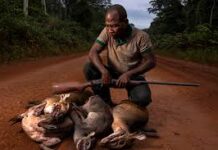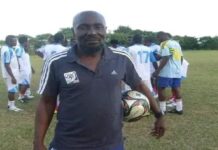By Stephen Binda | Washington D.C.
A sporadic international statement will shortly be released from the US government harmmering additional sanctions on Liberia war criminals; setting the tone for possible public statement from US President Joe Biden.
The statement likely by US President seeks to pressure the George Weah administration into setting up a war and economic crimes court. Major international actors have singled U.S. commitment to covering all expenses.
“I will agree with you Mr. chairman that US$35 million seem to be a possible start,” Dr. Alan W. White, former Chief of Investigations, Special Court for Sierra Leone said during the hearing.
Also under consideration is holding back of major funding towards Liberia’s annual budget and infrastructural programs
The move comes as both local and international peace actors conclude a two hours long pressure packed public hearing in Washington DC to examine the legacy of Liberia’s civil wars on its people and economy, the structure and likely policy implications of a proposed War Crimes & Economic Crimes Court for Liberia, and grassroots efforts to secure rule of law in the country and meet victims’ needs.
Organized by Tom Lantos Human Rights Commission, today’s meeting was chaired by congress man Christopher H. Smith, Co-Chair, TLHRC, congressman James P. McGovern Co-Chair, TLHRC.
In attendance included Miss Ysyndi Martin-Kepyei, Executive Director of the Movement for Justice in Liberia (MOJUL), Jerome V. Verdier, Esq, Executive Director, International Justice Group and former Chairman of the Truth and Reconciliation Commission for Liberia, Michael Mueller, Chairman of the Global Initiative for Justice and Dr. Alan W. White, former Chief of Investigations, Special Court for Sierra Leone.
According to our reporter, Monday’s meeting witnessed panelists citing the cultural of impunity in Liberia as a major hideout for war criminals as well as the continuous abuse of human rights as factors leading their drive.
“I think a public statement is necessary and perhaps a public statement from the President himself on this matter will help put some pressure,” Congressman Chris Smith lamented during the hearing.
Momentum for a War Crimes and Economic Crimes Court for Liberia continue to swell. Actors hope to help redress the wounds of the country’s civil war, though its creation is far from certain despite the recommendations of the country’s Truth and Reconciliation Commission in 2009 and continuous pressure from grassroots groups throughout Liberia.
Liberian President George Weah has equivocated with regard to the court’s creation, backsliding from earlier support during his campaign for president and recent speech to the United Nations a year ago.
For the past few decades, Liberia’s people have suffered untold human rights violations while perpetrators acted with near-complete impunity during the country’s multiple civil wars.
Between 1989 and 2003, 250,000 Liberians died from the fighting, and thousands more were conscripted as child soldiers, raped, suffered loss of limb, and other traumatic experiences. Since that time, not a single war crimes trial has occurred in Liberia as part of the country’s judicial process.























Comments are closed.